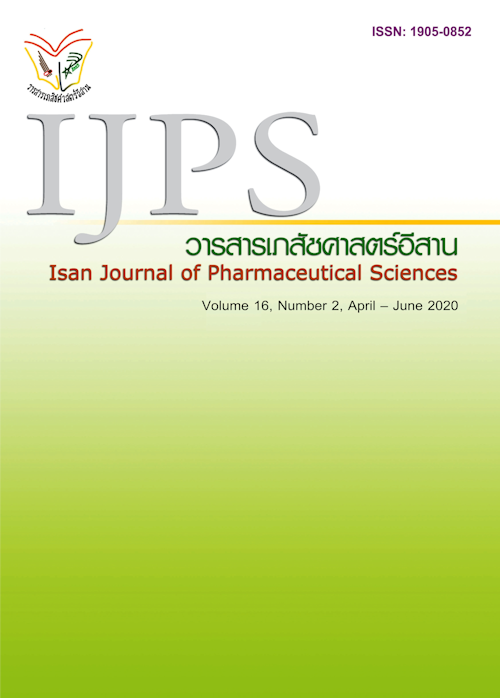Adverse events of patients receiving rituximab, bevacizumab and omalizumab at King Chulalongkorn Memorial Hospital
Main Article Content
Abstract
Monoclonal antibodies (MAbs) have been widely used for treatment of many diseases. Mouse-derived MAbs were the first MAb used in humans. However, the presence of human anti-mouse antibody was often reported following its use. Consequently, chimeric and humanized MAbs were developed to reduce immunogenicity by protein contents. Nevertheless, adverse events (AEs) have been reported from patients receiving these two MAbs drugs in many countries. AEs from patients in Thailand have not been systemically investigated. This research aims to report AEs from Thai patients using monoclonal antibody drugs including rituximab, bevacizumab and omalizumab. Method: A retrospective observational study was conducted utilizing medical records of 152 patients (19-60 years, median 50 years, 65 men and 87 women) who received rituximab (102 patients) or bevacizumab (42 patients) or omalizumab (8 patients) from January to December 2018 at King Chulalongkorn Memorial Hospital. Results: Total AEs were reported from 59 patients (57.8%) who received rituximab, 32 patients (76.2%) who received bevacizumab and 5 patients (62.5%) who received omalizumab. Very common AEs (more than or equal to 10%) were infections, neutropenia, febrile neutropenia, infusion reactions, disorders of gastrointestinal (GI) system. Most patients (92.9%) in bevacizumab group and almost half of patients (47.0%) in rituximab group had been given chemotherapy concomitantly. Nonetheless, AEs were also reported from the patients receiving rituximab (15.3%) without concomitantly chemotherapies. Moreover, common (more than or equal to 1% but less than 10%) serious AEs were observed in patients receiving rituximab and bevacizumab including GI perforation, pneumonia, cardiovascular events, viremia, septicemia, hydrocephalus, thrombosis with pulmonary embolism, pancytopenia; and severe neutropenia and thrombocytopenia. Conclusion: The incidences of AEs from patients receiving rituximab, bevacizumab and omalizumab were more than 50%. The results of this will assist multidisciplinary team involving MAb therapy to be more vigilant in surveillance the very common AEs and common serious AEs of the MAb drugs.
Article Details
In the case that some parts are used by others The author must Confirm that obtaining permission to use some of the original authors. And must attach evidence That the permission has been included
References
Abu-Hejleh T, Mezhir JJ, Goodheart MJ, Halfdanarson TR. Incidence and management of gastrointestinal perforation from bevacizumab in advanced cancers. Curr Oncol Rep 2012; 14: 277-284.
Catapano AL, Papadopoulos N. The safety of therapeutic monoclonal antibodies: Implications for cardiovascular disease and targeting the PCSK9 pathway. Atherosclerosis 2013; 228: 18-28.
Curtis BR, Swyers J, Divgi A, McFarland JG, Aster RH. Thrombocytopenia after second exposure to abciximab is caused by antibodies that recognize abciximab-coated platelets. Blood 2002; 99: 2054-2059.
Ewer MS, Vooletich MT, Durand JB, et al. Reversibility of trastuzumab-related cardiotoxicity: new insights based on clinical course and response to medical treatment. J Clin Oncol 2005; 23: 7820-7826.
Feugier P. A review of rituximab, the first anti-CD20 monoclonal antibody used in the treatment of B non-Hodgkin's lymphomas. Future oncology (London, England). 2015; 11(9): 1327-1342.
Genentech, Inc. Avastin prescribing information. 2019. [cited 2019 Dec 4]. Available from: https://www.avastin-hcp.com
Grant C, Wilson WH, Dunleavy K. Neutropenia associated with rituximab therapy. Curr Opin Hematol 2011; 18(1): 49-54.
Guidelines for Preparing Core Clinical-Safety Information on Drugs - Report of CIOMS Working Group III (1995). [cited 2019 Apr 4]. Available from: https://cioms.ch/shop/product/guidelines-preparing-core-clinical-safety-information-drugs-report-cioms-working-group-iii/
Hansel TT, Kropshofer H, Singer T, Mitchell JA, George AJ. The safety and side effects of monoclonal antibodies. Nat Rev Drug Discov 2010; 9: 325-338.
Hayman SR, Leung N, Grande JP et al. VEGF inhibition, hypertension and renal toxicity. Curr oncol Rep 2012; 14: 285-294.
Health Product Vigilance Center (HPVC). Spontaneous reports of adverse drug reactions/2017. Food and Drug Administration, Thailand.
Karmacharya P, Poudel DR, Pathak R, et al. Rituximab-induced serum sickness: A systematic review. Seminars in arthritis and rheumatism 2015; 45(3): 334-340.
Maggi E, Vultaggio A, Matucci A. Acute infusion reactions induced by monoclonal antibody therapy. Expert Rev Clin Immunol 2011; 7: 55-63.
Moore DC. Drug-induced neutropenia: a focus on rituximab-induced late-onset neutropenia. Pharm thera 2016; 41(12): 765-768.
Newsome BW, Ernstoff MS. The clinical pharmacology of therapeutic monoclonal antibodies in the treatment of malignancy; have the magic bullets arrived? Br J Clin Pharmacol 2008; 66: 6-19.
Salles G, Barrett M, Foà R, et al. Rituximab in B-Cell hematologic malignancies: a review of 20 years of clinical experience. Adv Thera 2017; 34(10): 2232-2273.
Singh JA, Wells GA, Christensen R, et al. Adverse effects of biologics: a network meta-analysis and cochrane overview. Cochrane database of systematic reviews. Cochrane Database Syst Rev 2011; 2: CD008794.
Tan RA, Corren J. Safety of omalizumab in asthma. Expert Opin Drug Saf 2011; 10(3): 463-471.
Taugourdeau-Raymond S, Rouby F, Default A, Jean- Pastor MJ.Bevacizumab-induced serious side- effects: a review of the French pharmacovigilance database. European J Clin Pharmacol 2012; 68(7): 1103–1107.
Tridente G. Adverse events with biomedicines: Prevention through understanding. Milan. Springer-Verlag Italia; 2014.


